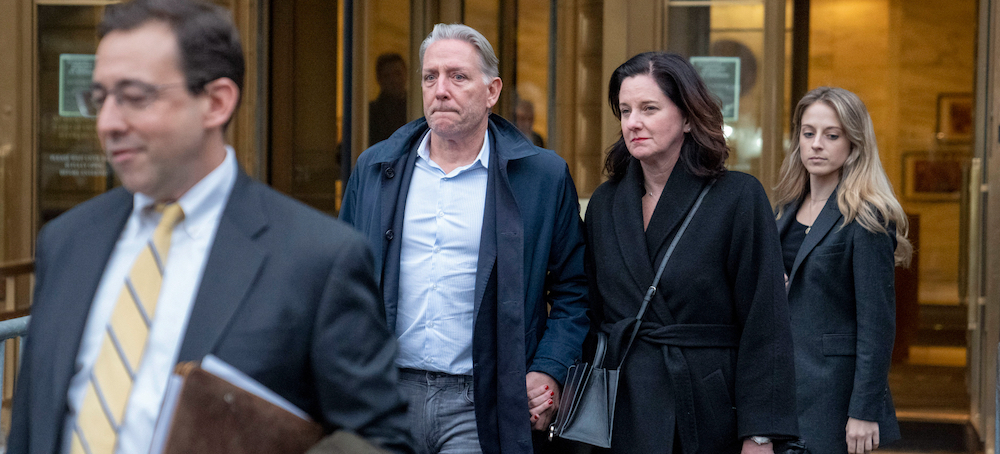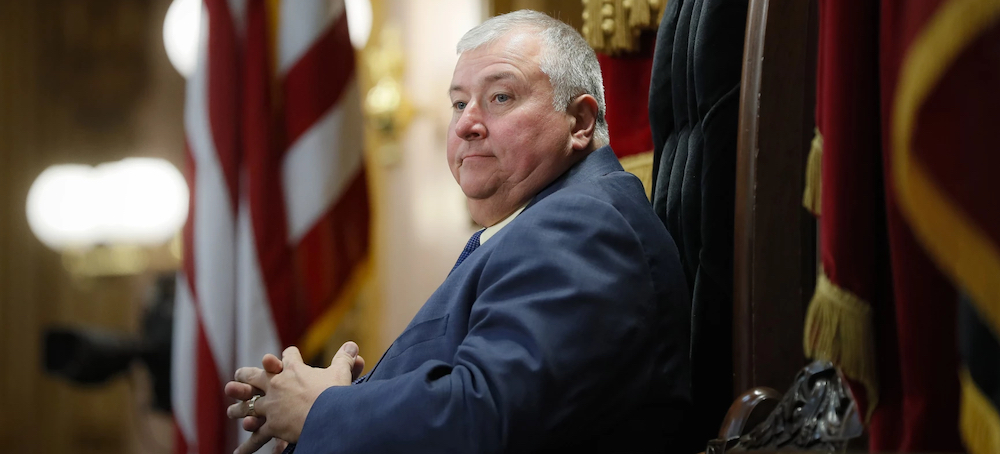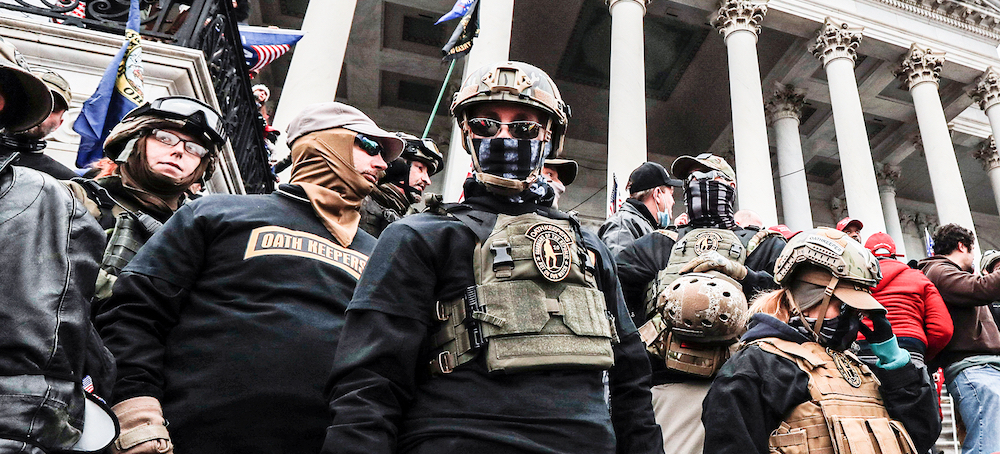Live on the homepage now!
Reader Supported News
“If you’re more likely to be meeting with the powerful than the powerless, you’re doing this job incorrectly," Rep. Ruben Gallego said
In English- and Spanish-language videos posted to his Twitter account, Gallego, who represents Arizona’s 7th congressional district, said that he is running for the Senate in 2024 to “win back” the American Dream for the people of Arizona. “There is no lobbyist for American families,” Gallego said, “if you’re more likely to be meeting with the powerful than the powerless, you’re doing this job incorrectly.”
Growing up poor, all I had was the American dream. It kept me going: as a kid sleeping on the floor, a student scrubbing toilets, a Marine losing brothers in Iraq.
— Ruben Gallego (@RubenGallego) January 23, 2023
Today, too many Arizonans see their dream slipping away. I’m running for the U.S. Senate to win it back for you! pic.twitter.com/ofUvUYRcTP
Gallego was elected to the House of Representatives in 2014, and has served on the House Committee on Armed Services, as well as the House Committee on Natural Resources.
Sinema has not yet announced if she will be seeking re-election in 2024, her departure from the Democratic Party means she would be running as an independent, a move which could result in a three-party split in the general election.
Senator Sinema’s office did not immediately reply to a request for comment from Rolling Stone.
READ MORE  Attorney Seth DuCharme said it was a 'distressing day' for former FBI official Charles McGonigal as they left the U.S. District Court in Manhattan on Jan. 23. (photo: WP)
Attorney Seth DuCharme said it was a 'distressing day' for former FBI official Charles McGonigal as they left the U.S. District Court in Manhattan on Jan. 23. (photo: WP)
Charles McGonigal, a former counterintelligence chief, is also accused of taking $225,000 from a former Albanian intelligence worker while still at the FBI
Charles McGonigal, 54, who retired from the FBI in September 2018, was indicted in federal court in Manhattan on charges of money laundering, violating U.S. sanctions and other counts stemming from his alleged ties to Deripaska, an ally of Russian President Vladimir Putin. In his role at the FBI, McGonigal had been tasked with investigating Deripaska, whose own indictment on sanctions-violation charges was unsealed in September.
A second indictment, filed in Washington, accused McGonigal of hiding payments totaling $225,000 that he allegedly received from a New Jersey man employed decades ago by an Albanian intelligence agency. The indictment also accused him of acting to advance that person’s interests.
McGonigal’s alleged crimes may undercut Justice Department efforts to ramp up economic sanctions on wealthy Russians after last year’s invasion of Ukraine. The twin indictments are also a black eye for the FBI, alleging that one of its most senior and trusted intelligence officials accepted large sums of money and undermined the bureau’s overall intelligence-gathering mission.
McGonigal was arrested by agents from the bureau where he had worked for 22 years and where he rose to one of the most important counterespionage positions in the U.S. government. Given his former role, the investigation was run by FBI agents in Los Angeles and D.C. rather than in New York.
FBI Director Christopher A. Wray said the case showed the FBI did its duty. “The way we maintain the trust and confidence of the American people is through our work — showing, when all the facts come out, that we stuck to the process and we treated everyone equally, even when it is one of our own,” Wray said in a statement. “We hold ourselves to the highest standard, and our focus will remain on our mission and on doing the right thing, in the right way, every time.”
Through his lawyer, Seth DuCharme, McGonigal pleaded not guilty to the New York charges at a brief court appearance Monday, where he was released on bond. DuCharme, a former Justice Department official who recently served as acting U.S. attorney in Brooklyn, said outside the courthouse that he looks forward to reviewing the evidence, “but we have a lot of confidence in Mr. McGonigal.”
“As you all know, Charlie’s had a long distinguished career with the FBI. He served the United States for decades,” DuCharme said. “This is obviously a distressing day for Mr. McGonigal and his family.”
McGonigal is scheduled to appear via video link in federal court in D.C. on Wednesday. In that case, prosecutors alleged that from at least August 2017 — and continuing after his retirement from the FBI — McGonigal failed to disclose to the FBI his relationship with the former Albanian intelligence worker, described as “Person A” in charging papers. He also allegedly failed to disclose that he had an “ongoing relationship with the Prime Minister of Albania,” the indictment said. Since 2013, Edi Rama has served as the prime minister of that country.
In late 2017, authorities charge, McGonigal received sums of cash totaling $225,000 from Person A — the first time in a parked car outside a New York City restaurant, and the next two times at the person’s New Jersey home. According to the indictment, McGonigal “indicated to Person A that the money would be paid back.”
Months later, at McGonigal’s urging, the FBI opened an investigation into an American lobbyist for an Albanian political party that is a rival of Rama, an investigation that used Person A as a source of information, authorities said.
That was not the only instance in which the indictments suggest McGonigal used his job for the benefit of people with whom he had undisclosed financial or personal relationships.
On a 2017 trip to Austria, McGonigal and a Justice Department prosecutor interviewed an Albanian businessperson and politician who had previously told McGonigal that they wanted someone to investigate a death threat against them, according to the indictment in Washington. McGonigal had been introduced to that individual by Person A, the indictment charges.
The following year, McGonigal allegedly asked the FBI’s liaison to the United Nations to arrange a meeting with the then-U.S. ambassador, Nikki Haley, or another high ranking official, as well as a former Bosnian defense minister and founder of a Bosnian pharmaceutical company.
The indictment says McGonigal’s associates sought that meeting for political reasons that would have benefited Person A financially. At the time, the indictment charges, McGonigal suggested that the pharmaceutical company pay half a million dollars to a company registered to Person A, as a fee for arranging the meeting.
Current and former U.S. officials who know and have worked with McGonigal said they were shocked by the indictments. As a senior FBI counterintelligence official, McGonigal had access to an extraordinary amount of sensitive information, potentially including investigations of foreign spies or U.S. citizens suspected of working on behalf of foreign governments, these people said, speaking on the condition of anonymity because of the sensitivity of the work McGonigal did. One former official said McGonigal had worked with the CIA on counterintelligence matters.
According to the New York indictment, a law firm retained McGonigal to work as a consultant and investigator on the effort to get Deripaska removed from the sanctions list. He was listed as a consultant and arranged for $25,000 monthly payments to be sent to an account controlled by another person, an interpreter for the U.S. government who was a former Russian diplomat. The interpreter, Sergey Shestakov, was also charged.
McGonigal’s FBI role gave him access to classified information, including a then-secret list of Russian prospects for sanctioning by the Office of Foreign Assets Control, the Justice Department said. That list included Deripaska before the sanctions were actually imposed.
Manhattan U.S. Attorney Damian Williams said in a statement that McGonigal and Shestakov “should have known better” given their experience in government service. Shestakov also pleaded not guilty.
U.S. Attorney Matthew M. Graves of D.C. called the alleged coverup of foreign contacts and financial relationships a “gateway to corruption,” and he credited the FBI with its handling of the “delicate and difficult” investigation of a former high-ranking official.
“McGonigal is alleged to have committed the very violations he swore to investigate while he purported to lead a workforce of FBI employees who spend their careers protecting secrets and holding foreign adversaries accountable,” said the FBI assistant director in charge of the Los Angeles field office, Donald Alway, who announced the charges along with Graves and the leaders of the D.C. FBI office and the Justice Department National Security Division. Asked about the case Monday, Attorney General Merrick Garland declined to comment.
McGonigal faces a statutory maximum sentence of 20 years in prison on the two D.C. counts of falsification of records and documents, and up to five years in prison for each of seven counts of concealing material facts or making false statements. The most serious charge in the New York indictment carries a maximum possible sentence of 20 years in prison.
McGonigal joined the FBI in 1996, working in New York, Washington, Baltimore and Cleveland. Along the way, he was involved in some of the most sensitive and high-profile intelligence cases in the U.S. government, including the conviction of former national security adviser Samuel Berger for knowingly removing classified documents from the National Archives. In 2010, McGonigal was tapped to lead the task force probing the anti-secrecy group WikiLeaks.
The charges against McGonigal alarmed his former colleagues in part because of his depth of knowledge of so many elements of U.S. espionage. McGonigal was an expert on Russian intelligence activities targeting the United States, as well as U.S. efforts to recruit Russian spies, said several former intelligence officials who worked with him and spoke on the condition of anonymity to describe sensitive matters.
His position at the New York field office would have given him direct access to past and current recruitment efforts, work that was coordinated with the CIA, these people said. McGonigal was well-known at the CIA among officers who dealt with Russia and counterintelligence matters, and he knew the details of some intelligence operations targeting Russia, former officials said.
McGonigal has not been charged with espionage, but the former officials who worked with him said his knowledge and experience would have put him at high risk of being recruited by a foreign government.
One former official noted that McGonigal was in charge of an investigation into why numerous individuals in China who were spying for the United States were arrested and taken out of commission. As part of that investigation, McGonigal would have known details about the covert systems that the CIA used to communicate with its agents, the former official said. Those systems are believed to have played a central role in exposing the agents to government authorities.
Deripaska has been a focus of FBI investigative work for many years. In 2021, agents searched two homes linked to him, one in D.C. and the other in New York. At the time, a spokeswoman for the aluminum tycoon said the properties were owned by his relatives.
The name of Deripaska, a politically connected billionaire, came up repeatedly in recent U.S. investigations involving Russia and the 2016 presidential campaign of Donald Trump. Deripaska did business for years with Paul Manafort, whose tenure as Trump’s campaign chairman became an intense focus of FBI investigations.
Manafort and Deripaska have both confirmed that they had a business relationship in which Manafort was paid as an investment consultant. In 2014, Deripaska accused Manafort in a Cayman Islands court of taking nearly $19 million intended for investments without accounting for how they were used.
READ MORE  Former Ohio house speaker Larry Householder. (photo: John Minchillo/AP)
Former Ohio house speaker Larry Householder. (photo: John Minchillo/AP)
Prosecutors built their racketeering case with wiretaps, undercover agents and confidential sources
The trial, which is expected to last six weeks, is the latest utility scandal following cases in the last 10 years in Arizona, Louisiana, Alabama and Florida which experts say has led to higher bills for consumers, less green energy, and more CO2 emissions.
One of the defendants, the former Ohio house speaker Larry Householder, told reporters on Monday morning as he waited for opening statements in the US district court in Cincinnati that he had done nothing wrong and expected “redemption”.
Householder is charged with one count of racketeering, and if convicted, faces up to 20 years in prison.
Prosecutors allege that Householder and the four men indicted alongside him received over $60m in bribes from the Akron, Ohio-based FirstEnergy corporation and its subsidiaries.
Prosecutors argue that in exchange, Householder and his co-conspirators passed HB-6, a bill that would have delivered $1.4bn in customer funded bailouts to two ailing nuclear plants controlled by the utility. Nuclear power has struggled to compete with comparatively cheap gas plants in recent years.
“Larry Householder sold the statehouse,” assistant US attorney Emily Glatfelter told jurors in the government’s opening statement. “He ripped off the people he was elected to serve and made backroom deals to exchange his power for money.”
Householder contends that he did nothing wrong, and never took a bribe. “Larry never entered into any corrupt illicit agreement with First Energy. Larry never entered into any promise, no quid pro quo exchange,” his lead defense attorney Steven Bradley said.
At the heart of the case are the over $60m from FirstEnergy and its subsidiaries that Householder and his four co-conspirators received via several “dark money” tax-exempt entities, the most important of which was Generation Now.
Such organizations, known as 501(c)4’s, are ostensibly meant to promote “social welfare”. Federal tax and case law allows them to withhold the names of their donors. “A 501(c)4 is a perfect entity to receive a secret bribe,” prosecutor Glatfelter told the court.
In exchange for the millions to Householder, FirstEnergy got $1.4bn of subsidies for two of its ailing nuclear plants, prosecutors allege. The subsidies came in the form of HB-6, a bill championed by Householder as one of the signature pieces of legislation of his speakership. The law slapped a surcharge on to the electric bills of everyday Ohioans and went toward making the two nuclear plants profitable.
“It doesn’t matter if it was good or bad legislation. It was corrupt legislation,” Glatfelter told the court.
Householder and his co-conspirators allegedly used the FirstEnergy cash to make sure that Republicans friendly to the company’s agenda – and to Householder’s leadership claim – were elected. In one 2018 race, a charging document alleges, Householder’s conspirators used the power company cash to run deceptive ads implying a rival candidate had driven while under the influence. The man hadn’t, but the last minute ad-blitz cost him the seat by 138 votes.
Householder, the government contends, also used the cash for more than just political power. Court records show some $215,000 went to pay the legal bills of a lawsuit he settled. Another $100,000 went toward the cost of a home in Naples, Florida. His defense attorneys say this was a loan that he intended to pay back.
In July 2021, FirstEnergy pleaded guilty to its role in the scheme, agreeing to pay a $230m penalty.
Asked about its involvement in the case, the company said it had adopted new political giving standards “grounded in integrity and transparency”.
Another company that paid $700,000 into Generation Now, American Electric Power, was allowed to charge Ohio electricity customers $1.50 a month to subsidize ailing coal plants it owned. It has not been charged. A spokesman for the company said it “actively participate(s) in the political process in an ethical and lawful manner”.
After the bill passed, Householder and his four co-conspirators are accused of using further millions of FirstEnergy cash to defeat a ballot referendum that would have disarmed major provisions of the bill.
“The millions paid into the entity were akin to bags of cash,” a federal criminal affidavit reads. “They were not regulated, not reported, not subject to public scrutiny.”
The Ohio FirstEnergy scandal is part of a larger trend.
Over the past decade, the accelerating energy transition away from fossil fuels and a move to competitive energy markets have challenged monopoly utilities.
In 2014, Arizona Public Service pumped millions of dollars into dark money groups meant to elect regulators more friendly to its agenda and who were opposed to rooftop solar. The spending was suspicious enough to prompt an FBI investigation in 2016. Recently, state regulators there have forced the company to disclose more information about its political spending. The inquiry revealed the organization had spent more than $22m in donations to tax exempt organizations between 2019 and 2021.
READ MORE  A doctor and patient. (photo: Rawpixel/Getty Images)
A doctor and patient. (photo: Rawpixel/Getty Images)
But this milestone anniversary, on January 22, falls just short of seven months after another landmark abortion decision: the Dobbs v. Jackson Women's Health Organization ruling issued June 24 that overturned Roe.
After Dobbs, many clinics in red states where restrictive abortion laws have been enacted have been forced to close their doors and move, or stay open and dramatically shift the services they're providing.
New landscapes
The CHOICES clinic in Memphis, Tenn., opened in 1974 in direct response to the Roe v. Wade decision a year earlier. When the U.S. Supreme Court announced it would take up the Dobbs case, CHOICES president and CEO Jennifer Pepper says it was clear what was coming.
"We knew immediately that meant we would lose abortion access in Tennessee in the next 12 months, and so we began to plan," Pepper says. "It has been a wild ride."
The clinic began working toward opening a second location in southern Illinois — a state controlled by Democrats with a political environment friendly to abortion rights. In October, they began seeing patients at that new location in Carbondale, about a three-hour drive from Memphis.
The Memphis clinic has stayed open and offers other types of reproductive health care, including a birth center and gender-affirming care.
New services
In Oklahoma, where abortion became illegal last May under a Texas-style law threatening providers with lawsuits, the Trust Women clinic in Oklahoma City has also pivoted toward other services, including gender-affirming care, family planning and even medication-based opioid treatment.
Rebecca Tong, the co-executive director, describes the area as a "healthcare desert." Tong says the organization looked at what the community needed and tried to adjust accordingly.
"We're committed to staying in Oklahoma City, providing care for the same patient population - and an expanded patient population," she says.
After Oklahoma banned abortion, Tong says her organization shifted abortion services to its other clinic, in Wichita, Kan., where abortion remains legal.
"We're seeing patients twice as many days as we had in the past. The level of staffing that we're at, we've never had this many staff," Tong says. "All of this is new."
Tong says patient volume in Kansas has roughly quadrupled since last summer, and the clinic had to make changes to its phone system to handle the increased call volume.
"We've changed almost everything," she says.
New situations
Many clinics that stay open — or reopen in a new location — are finding themselves at or near capacity.
The clinic at the center of the Dobbs case, Jackson Women's Health, relocated to Las Cruces, New Mexico. Owner Diane Derzis, who operates several clinics nationwide, says they're no longer able to provide a full spectrum of reproductive health care.
"We are just doing abortions; we are strictly abortion clinics now. That's all we have time to do," Derzis says.
It's also a challenging time for patients, according to Tammi Kromenaker, whose Red River Women's Clinic moved from Fargo, N.D., to Moorhead, Minn., last August.
"It's one community in Fargo-Moorhead," she says. "But the difference between the two states ... is literally night and day."
Kromenaker says many of her patients are scared and confused.
"I literally had a patient say to me, 'Will I go to jail if I come from North Dakota to Minnesota?' " she says.
She reassured the patient that she would not be penalized for crossing state lines under current law. But many legal experts predict that the years to come will bring intensifying efforts by abortion rights opponents to make interstate travel for abortion more difficult, if not illegal.
New boundaries, new battles
Other abortion providers are experimenting with mobile health care, moving toward offering abortion pills and some surgical procedures through mobile units.
In Illinois, where a Planned Parenthood clinic across the state line from St. Louis, Mo., has experienced an influx of patients from across the region, administrators recently purchased an RV to serve patients traveling from around the region to various temporary locations across southern Illinois. An organization called Just the Pill has launched a similar unit based in Colorado.
The objective is to get closer to patients in states with abortion bans while staying within the boundaries of states where abortion remains legal.
Kristan Hawkins, with the anti-abortion rights group Students for Life, says activists are looking at ways to restrict abortion at the local level, even in states where it remains legal.
"It's gonna be the city campaigns," Hawkins says. "It's, 'What can we do?' Is it passing some sort of ordinance in the city council? Is it getting more active on the streets?"
Julie Burkhart, who's been involved in the abortion rights movement for decades and co-owns a clinic in Illinois, says clinics have faced opposition for years and will continue finding ways to adapt.
"We have Dobbs now, but that doesn't mean that we are done as service providers," she says. "That does not mean we are done as a movement."
READ MORE  Chunli Zhao, 67, the suspect in the killing of seven people, being taken into custody in Half Moon Bay, Monday, Jan. 23, 2023. (photo: NBC)
Chunli Zhao, 67, the suspect in the killing of seven people, being taken into custody in Half Moon Bay, Monday, Jan. 23, 2023. (photo: NBC)
Police arrested 67-year-old Zhao Chunli of Half Moon Bay at about 4:40 p.m. Monday, shortly after finding him in his vehicle at the parking lot of a San Mateo County Sheriff’s Office substation. Zhao is believed to have acted alone in the shootings, Corpus said.
Both sites are plant nurseries, including a mushroom farm, in a rural area, Corpus said, and Zhao is believed to be a worker at one of the locations. Corpus said the victims, who are still being identified by a coroner, are also believed to be farmworkers in Half Moon Bay, which is about a 40-minute drive from San Francisco and has a population of fewer than 11,400 people.
READ MORE  Members of the Oath Keepers militia group stand among supporters of Donald Trump occupying the east front steps of the U.S. Capitol, January 6, 2021. (photo: Jim Bourg/Reuters)
Members of the Oath Keepers militia group stand among supporters of Donald Trump occupying the east front steps of the U.S. Capitol, January 6, 2021. (photo: Jim Bourg/Reuters)
Members of anti-government militia found guilty for roles in January 6 attack at the US Capitol
The verdict against Joseph Hackett of Sarasota, Florida, Roberto Minuta of Prosper, Texas, David Moerschel of Punta Gorda, Florida, and Edward Vallejo of Phoenix, Arizona, came a few weeks after a different jury convicted the group’s leader, Stewart Rhodes, in the mob’s attack that delayed the certification of Democrat Joe Biden’s 2020 presidential election victory over Republican Trump.
The convictions were another major victory for the Department of Justice, which is also trying to secure sedition verdicts against the former leader of the hard-right, violent, all-male nationalist group the Proud Boys and four associates. The trial against Enrique Tarrio and his lieutenants opened earlier this month in Washington DC and is expected to last several weeks.
They are some of the most serious cases brought so far in the sweeping investigation into the Capitol attack, which continues to grow two years after the riot. The justice department has brought nearly 1,000 cases and the tally increases by the week.
Defense attorneys sought to downplay violent messages as mere bluster and said the Oath Keepers came to Washington to provide security at events before the riot.
They seized on prosecutors’ lack of evidence that the Oath Keepers had an explicit plan to storm the Capitol before January 6 and told jurors that the extremists who attacked the Capitol acted spontaneously like thousands of other rioters.
Rhodes founded the Oath Keepers, whose members include current and retired military personnel, law enforcement officers and first responders, in 2009.
Members have showed up, often heavily armed, at protests and political events including demonstrations following the May 2020 murder of George Floyd by a white police officer in Minneapolis.
READ MORE  Climate advocates say the E.P.A. has yet to propose rules to limit greenhouse gas emissions from new gas-fired power plants and existing coal and gas plants. (photo: Kendrick Brinson/NYT)
Climate advocates say the E.P.A. has yet to propose rules to limit greenhouse gas emissions from new gas-fired power plants and existing coal and gas plants. (photo: Kendrick Brinson/NYT)
Despite an injection of funding, the agency still has not recovered from an exodus of scientists and policy experts, both insiders and critics say.
And now this: the stressed-out, stretched-thin Environmental Protection Agency is scrambling to write about a half dozen highly complex rules and regulations that are central to President Biden’s climate goals.
The new rules have to be enacted within the next 18 months — lightning speed in the regulatory world — or they could be overturned by a new Congress or administration.
The regulations are already delayed months past E.P.A.’s own self-imposed deadlines, raising concerns from supporters in Congress and environmental groups. “It’s very fair to say we are not where we hoped we’d be,” said Miles Keogh, executive director of the National Association of Clean Air Agencies, which represents most state and local air regulators.
As staffing at the E.P.A. thinned out, the workload only increased, both the agency and its critics say.
Career employees are being “worked to death,” said Betsy Southerland, a former top E.P.A. scientist. “They’re under the greatest pressure they’ve ever been.”
Biden administration officials insist the agency has delivered more environmental protections than any previous presidency and listed dozens of new policies, including the creation of a high-level office focused for the first time on addressing racial disparities when it comes to environmental hazards.
The agency’s administrator, Michael S. Regan, has promised that new regulations being written by his staff now will be made public by spring. Agency officials said that the E.P.A. has stepped up its recruitment efforts and has purchased software that has helped it identify more potential job candidates, particularly from universities.
“The agency is moving further and faster than ever before,” Dan Utech, Mr. Regan’s chief of staff, said in a statement. He added that accomplishments had come “despite depleted staffing levels, persistent funding challenges and a previous administration that left the agency neglected and scientifically compromised.”
The E.P.A. is at an unusual juncture. The 2021 bipartisan infrastructure law and the climate law enacted last year have begun to pump $90 billion into the agency over the next 10 years for climate projects like $1.5 billion for new technologies to monitor and reduce methane emissions from oil and gas wells, $5 billion for states to purchase low-emission school buses and $3 billion to cut pollution at ports. For the first time, the E.P.A. has “a little bit of walking-around money,” Mr. Regan joked to staff at a recent meeting.
But experts said they worry the E.P.A.’s regulatory and enforcement work is taking a back seat to issuing grants.
“E.P.A. is a regulatory agency, and I worry the huge piles of money they now have to administer and manage could end up obscuring the regulatory work the statutes say they have to do,” said Eric Schaeffer, executive director of the Environmental Integrity Project, a watchdog group.
And time is running out.
Mr. Biden wants to cut United States greenhouse gas emissions roughly in half this decade in order to avoid the most severe climate disruptions. Analysts say that even with the new climate law, the president can’t achieve his goal without new regulations designed to cut carbon dioxide and other pollutants from power plants, cars and trucks.
The process from proposing a regulation to enacting it can take months, and the current delays may mean that some rules are not completed until next year. Under the Congressional Review Act, lawmakers can repeal any regulation within 60 legislative days of being finalized with a simple majority vote. So any final rule issued in late 2024 could be repealed by Republicans if they maintain control of the House and pick up seats in the Senate in the November 2024 elections.
Moreover, Biden administration climate rules are also likely to face legal challenges. If a new administration is elected in 2024, it might opt not to defend the rules in court.
A recent report card from Evergreen, an environmental group, found the E.P.A. was behind its own deadlines on nine key environmental regulations, including limits on power plant emissions of mercury and other toxic substances, ozone standards, and curtailing the storage of coal ash to avoid spills and contamination. Most worrisome, climate advocates said, is that the agency has yet to propose rules to limit greenhouse gas emissions from new gas-fired power plants and existing coal and gas plants — measures that energy analysts say will be necessary to eliminate fossil fuels from the electricity sector by 2035 as Mr. Biden has pledged to do.
In a recent interview, Mr. Regan said his agency has recently been reassessing its regulatory plans. The millions of dollars now available through the climate law to make it cheaper and easier for utilities and automobile manufacturers to move away from fossil fuels has led the agency to consider whether it could impose more stringent emissions goals than initially conceived, he said. That would move the power and transportation sectors of the economy even faster away from fossil fuels. He said developing the legal and economic justification for such regulations would take time but was nearing completion.
“This spring, you’re going to see a number of actions taken by E.P.A.” Mr. Regan said.
Despite the billions earmarked for climate programs, E.P.A. remains underfunded and understaffed when it comes to its other obligations, including enforcing environmental laws and evaluating chemicals to ensure they don’t pose an unreasonable risk to human health or the environment.
The nonpartisan Environmental Integrity Project recently found that federal environmental enforcement was slipping under Mr. Biden. E.P.A.’s civil cases against polluters hit a two-decade low in 2022, with 72 such enforcement cases closed in court. That’s fewer than during the Trump administration, which bristled against restrictions on industry yet closed an average of 94 enforcement cases per year. The Obama administration averaged 210 per year, the report found. E.P.A. officials said they were focused on protecting heavily polluted communities by increasing inspections and targeting the most serious violations.
Industries regulated by the E.P.A. are also frustrated, saying the agency is taking too long to determine whether new and existing chemicals pose an unreasonable risk to the environment or human health.
The American Chemistry Council, which represents companies like Dow, DuPont and ExxonMobil Chemical, is frustrated by “constant delays and lack of transparency in how resources are being deployed,” according to a statement from Kimberly Wise White, vice president of regulatory and scientific affairs at the trade group.
Michal Freedhoff, who leads the E.P.A.’s chemical unit, told Congress recently that the office of chemical safety would fall short of its obligations and miss many “significant statutory deadlines.” She blamed the fact that after a 2016 law significantly increased the agency’s duties, the E.P.A. under the Trump administration never sought the resources from Congress that were required to perform the work.
In fact, Mr. Trump tried each year to slash the E.P.A. budget by at least 30 percent. Highly skilled scientists and other experts left the agency as the Trump administration dismantled science advisory panels, disregarded scientific evidence and weakened protections against pollution.
“They beat down the E.P.A. work force, a lot of people left dispirited,” said Senator Tom Carper, Democrat of Delaware and chairman of the Committee on Environment and Public Works, which oversees the E.P.A.
The result is that the E.P.A.’s chemical safety office is way behind, Ms. Freedhoff told Congress. Attracting and retaining staff has been difficult because of the heavy workload, she said.
Mr. Carper said he was “impatient,” particularly with the regulatory delays, and had expressed that to Mr. Regan personally.
The E.P.A. is hiring and, in the past two years, has increased its payroll by 3 percent, up to 14,844 employees. But that has brought total staffing levels to slightly more than when Ronald Reagan was president.
Staffing at the E.P.A. peaked in 2004 during the George W. Bush administration, when there were 17,611 employees, according to the agency. Those levels ebbed and flowed slightly, but began to take a sharp dip during the Obama administration amid Republican control of the House and Senate.
When Mr. Trump entered the White House, the E.P.A. had 15,408 employees. The following year it dropped to 14,172 employees, a level that stood more or less steady until the Biden administration.
It was only last month that the agency received its first significant budget increase in years, an additional $576 million, for enforcement and compliance, as well as clean air, water and toxic chemical programs.
Max Stier, the head of the Partnership for Public Service, a nonpartisan organization that seeks to make government more effective, said the E.P.A. faced a “consequential hurdle” to both accomplishing the long list of rules that Mr. Biden has promised and to expanding further to make sure money from the new climate law gets spent effectively.
“You have an organization that was at some level traumatized to begin with, that was facing difficulties created over many, many years of divestment and now you have a new set of requirements that are going to call for new capabilities,” he said. “They’re going to have to build up their strength, and that does not happen overnight.”
Follow us on facebook and twitter!
PO Box 2043 / Citrus Heights, CA 95611



No comments:
Post a Comment
Note: Only a member of this blog may post a comment.